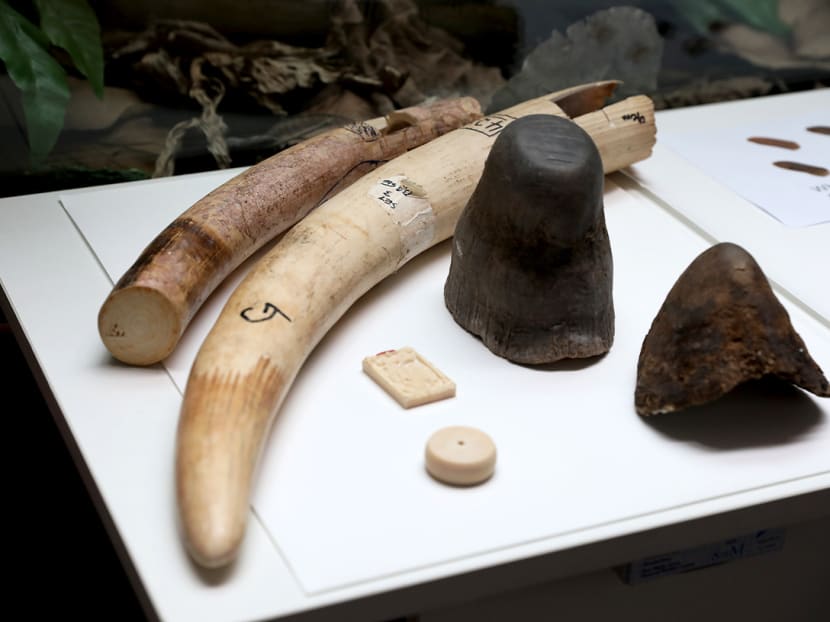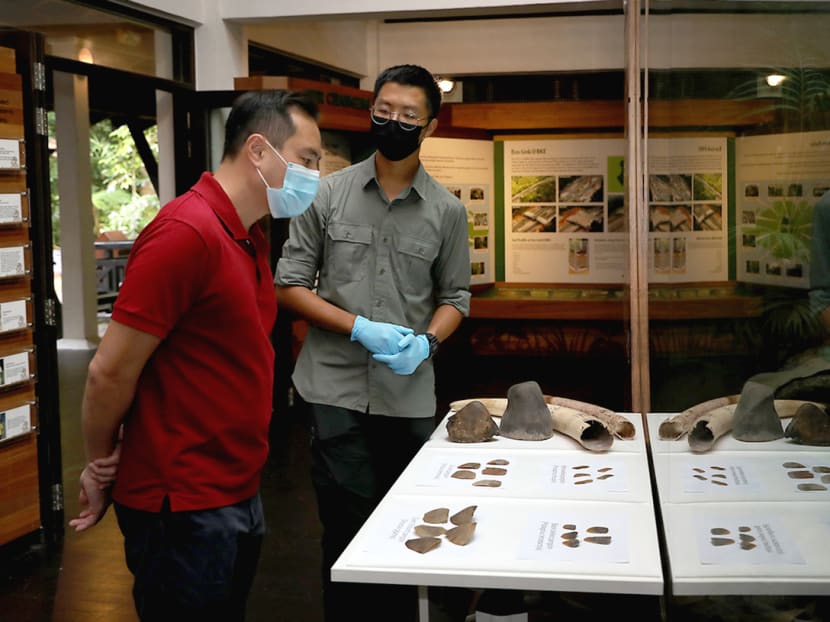S’pore proposing harsher penalties for illegal trade in endangered wildlife; holding public consultation
SINGAPORE — The Government is proposing much stiffer penalties for the illegal trade in wildlife such as the critically endangered Sunda pangolin, as well as safeguards to protect the identity of informers providing the authorities with information on the trade.

Samples of ivory and rhino horn at a roving exhibition at the Bukit Timah Nature Reserve's visitor centre gallery on Nov 12, 2021. The exhibition relates to proposed amendments to the Endangered Species (Import and Export) Act.
- Amendments in three broad areas have been proposed for the Endangered Species (Import and Export) Act
- This includes harsher penalties for the illegal trade of protected species and giving the National Parks Board more enforcement powers
- A public consultation on the proposed amendments has been launched and will end on Dec 12
SINGAPORE — The Government is proposing much stiffer penalties for the illegal trade in wildlife such as the critically endangered Sunda pangolin, as well as safeguards to protect the identity of informers providing the authorities with information on the trade.
The moves are among a list of proposed amendments to the Endangered Species (Import and Export) Act unveiled by Mr Tan Kiat How, Minister of State for National Development and Communications and Information.
Mr Tan, who was speaking to reporters virtually on Friday (Nov 12) from the Bukit Timah Nature Reserve's visitor centre, also launched a month-long public consultation for members of the public to share their views on the amendments.

The proposed changes to the Act, which was last amended in 2006, fall under three broad categories, the National Parks Board (NParks) said during a related press conference on Friday.
It aims to introduce the Bill containing the amendments to Parliament next March.
INCREASING PENALTIES FOR ILLEGAL TRADE OF PROTECTED SPECIES
One category of the proposed amendments would see heavier penalties for the illegal trade in species protected under the Convention on International Trade in Endangered Species of Wild Fauna and Flora (Cites).
Cites regulates the international trade of wild animals and plants to ensure that it does not threaten their survival. Singapore became a signatory to the convention in 1986.
Under Cites, species for which trade is controlled are listed in three categories, or appendices, with each conferring a different level of regulation and requiring certain Cites permits or certificates.
The first appendix refers to species threatened with extinction, such as both Asian and African elephants and various species of pangolins including the Sunda pangolin.
The second appendix relates to species that are now not threatened with extinction but may become so without trade controls. They include many species of sea corals and even timber products such as mahogany.
The third appendix is a list of wildlife and plant species, such as the alligator snapping turtle, identified by particular Cites member countries as being in need of international trade controls.
At present, the maximum penalty for the illegal trade in species in all three categories is a fine of S$50,000 for each species and a jail term of two years.
Under the amendments, NParks and the Ministry of National Development (MND) propose to double both the fine and jail term to S$100,000 and four years’ imprisonment for those caught illegally trading species in appendix one — the most endangered species.
The same penalties apply to repeat offenders though the fine will not exceed an aggregate of S$500,000, or the market value of all specimens at the material time, whichever is higher.
The penalties will not change for first-time offenders caught illegally trading species in appendices two and three though repeat offenders will face the same penalties as those under appendix one.
STRONGER ENFORCEMENT POWERS
The second proposed amendment to the Act, NParks said, will give it stronger enforcement powers to tackle the illegal wildlife trade.
Part of this effort will see the introduction of safeguards to protect the identity of informers to encourage more individuals to come forward and provide information regarding the illegal wildlife trade.
If the amendments are passed, individuals in court proceedings, for example, may not be allowed to disclose the name, address, or any relevant particulars of an informer who has helped with the case.
This also includes the concealment of documents that may lead to the discovery of the informer’s identity.
“Doing so will enhance NParks’ investigative powers in evidence gathering and augment enforcement,” the agency said.
Apart from protecting the identity of informants, the proposed amendments will also make it clear that items used to deliberately conceal or convey Cites specimens — such as conveyances used for the smuggling — can be seized and forfeited.
CLARITY ON WHAT IS ALLOWED
The third main area of the proposed amendments involves providing greater clarity on what is allowed or not allowed under the Act, and to align it more closely with Cites resolutions.
For instance, this includes stating that an animal hybrid species found in either appendix one or two is considered a full species. One example is the Bengal cat, which is a crossbreed of the domestic cat and the Asian leopard cat.
This means that anyone hoping to import or export such hybrid species will be subject to the requirements under the relevant Cites appendix.
The amendments in this category will also make it clear that naturally excreted animal by-products, such as ambergris — generally referred to as whale vomit, and used in the perfume industry — are excluded from the Act.
NParks said that it also wants to make it clear in the Act the kind of documents that are needed for Cites species to transit through Singapore.
PUBLIC CONSULTATION
Members of the public who wish to provide their feedback on the proposed amendments as well as Singapore’s approach to combatting illegal wildlife trade have up to Dec 12 to do so.
Following the public consultation, Mr Tan said both MND and NParks will review the feedback received, before finalising the proposed amendments to the Act.
The threat posed by the illegal wildlife trade around the world is constantly evolving, he noted.
As it is highly profitable, smugglers are constantly on the lookout for loopholes to exploit, and there is therefore a need to “beef up” the Act, he added.
“As an international trading hub, Singapore is committed to this global fight against illegal wildlife trade.”
Feedback from the piblic may be submitted to NParks through an online survey, or a detailed response may be emailed to cites [at] nparks.gov.sg.
More information on the proposed amendments and Singapore’s approach to stemming the illegal wildlife trade is available at www.nparks.gov.sg/biodiversity/cites/public-consultation-on-esa.











